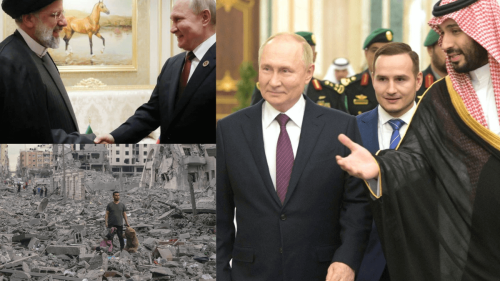Dealing with Turkey's Traps
At a time when Russian forces have been slaughtering Muslims in Chechnya, at a time when dogs are eating Muslim corpses in the streets of Grozny, the once-valiant state that led the Muslim community for half a millennium has failed even to "bark" in the dark. Yes, that state is Turkey -- no longer deemed a leader that holds a sway in world affairs, no longer a lion of Asia and Europe, but a spider trapped in its own webs of ineptitude.
Think of the excesses of Turkey's state authorities when it comes to the issues of Islam, liberty, human rights, or democracy. See how pathetic is its role when it comes to dealing with national emergencies within Turkey (e.g., during the earthquakes) or defense of Muslim lives and properties outside the country (e.g., Bosnia, Kosova, and Chechnya).
Three-quarters of a century ago, the Turkish state replaced Islam with another religion, the so-called Kemalist secularism, which has since been incapable of tolerating any views and values other than its own extremism. Goaded with this ideology, the generals and other state leaders that rule Turkey have found themselves "omnipotent" in denying free speech and freedom of political engagement to any one they have imagined to be a threat. They kicked out elected governments of Turkey several times until obtaining an overwhelming sway in the political decisions of the country.
Like the dwellers of Plato's cave, the steersmen of the Turkish state have seen any institutional practices of Islam to be dreadful monsters of their own hallucination. Consider how egregiously they have persisted in fighting expressions of Islam in what they define as public life. They have fired anyone who dared to practice Islam while serving in the armed forces of their country. They have mocked officials who refused to drink alcohol, which Islam forbids and which the latest scientific studies say weaken brain functions.
Consider, specifically, how disgracefully the Turkish state authorities have opposed one little piece of clothe, the headscarf, which Islam told Muslim women wear 14 centuries ago but which they considered a threat to their perverted ideology. They evicted hundreds of young women from state universities for refusing to remove it. They kicked Merv Kavaci out of her elected seat in the parliament and stripped her citizenship for the same reason. This past week, the Turkish courts rejected Kavaci's appeal to return her right to Turkish citizenship, repeating the mockery of trial that banned the Refah party from politics years ago.
Remember how powerfully they shut down Children's Qur'an classes several years ago. Now they are going to ban women teachers who wear headscarves from teaching even in private elementary schools.
More ominous, however, is the fact that from within their psychic prisons the Turkish authorities have created pitfalls for the people who embrace Islam as a way of life. Consider how the drama involving the terrorist Hizbullah is unfolding and is being used to demonize the sociopolitical role of Islam.
It was the Turkish military that ignored or supported this group of marauders who feigned an agenda set on the introduction of Islamic law in Turkey but actually violated the most basic tenet of Islam -- the sanctity of life -- by killing 57 Muslims. According to some observers, the military used the Hizbullah to counter the PKK. Either way, police have now charged 440 Turks with involvement with this group and are questioning 300 more.
Virtue party leader Recai Kutan enraged the armed forces as he accused them of ignoring the Hizbullah crimes until now. The generals retorted that Hizbullah's crimes were a vindication of their Islamophobia. Scared that the military may use this opportunity to close the Virtue party once again, the senior politicians in the party are now challenging their leader, Recai Kutan, for incurring the generals' wrath. But even if Kutan didn't accuse the military, he would have been accused of fostering the crimes of Hizbullah. That is what the generals have learned from their international sponsors.
Definitely, the situation of Muslims in general and Islamic politicians in particular is one of a nightmare or Catch-22 in Turkey. Anything you do in this situation will prompt Islamophobic reactions from the generals. As in a nightmare, you cannot end the predicament by struggling from within the system. You must stand out of the system and intervene creatively.
Options for creative intervention for Muslims in Turkey, however, are very few. Yet, they must be patient and try best not to allow the history of Algeria repeat in Turkey. They must also seek support from American and European Muslims who could exercise political influence through their governments and help the Turkish leaders to get out of their psychic prison and establish free speech, democracy, and rule of law.
Mohammad A. Auwal is an assistant professor in the Department of Communication Studies at California State University, Los Angeles and is a regular columnist for iviews.com

















